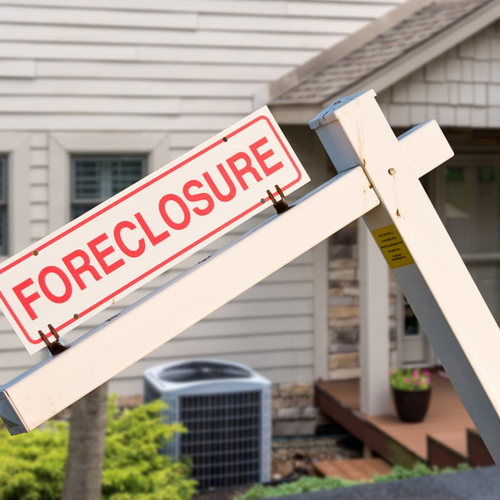Comparing Foreclosure and Deed in Lieu Options for California Homeowners
If you're facing financial strain in California, understanding the difference between foreclosure and a deed in lieu of foreclosure is vital. Foreclosure involves a lengthy process that can severely impact your credit score, often dropping it by 100 points or more. Conversely, a deed in lieu may result in a smaller decline in credit score, typically about 70 to 80 points, while simplifying the home relinquishment process. Each option has distinct implications, so exploring all alternatives is essential for making the best decision.
Understanding Foreclosure: The Basics
When you face financial difficulties and can’t keep up with mortgage payments, understanding foreclosure is crucial. Many homeowners grapple with foreclosure myths that can cloud judgment and hinder effective financial planning.

Not sure how foreclosure works? This short video provides a concise explanation of the basics in just a few minutes.
For instance, some believe that foreclosure is the only option when struggling with payments, but alternatives such as loan modifications or short sales also exist. It's essential to recognize that facing foreclosure doesn’t mean you’re alone; many resources can help you navigate these challenges.
Educating yourself about your rights and options empowers you to make informed decisions. By addressing misconceptions and focusing on proactive financial strategies, you can protect your interests and avoid the severe consequences of foreclosure.
Start exploring your options—taking action now can lead to better outcomes.
The Foreclosure Process in California
Understanding the foreclosure process in California is crucial for homeowners facing financial difficulties.
Foreclosure Timeline Explained
The foreclosure process in California typically unfolds over several key stages, each with specific timelines and requirements.
Initially, you’ll receive a Notice of Default (NOD) after missing payments for about 90 days. This begins your foreclosure timeline, granting you 90 days to cure the default.
If not resolved, a Notice of Trustee Sale follows, usually within 21 days. This notice sets a sale date, often occurring 21 days later.
In this period, you'll need to stay aware of legal deadlines to protect your interests. Understanding these stages helps you navigate the process effectively, empowering you to make informed decisions.
Staying proactive during this timeline is crucial to explore alternatives or seek assistance before the sale occurs.

Must-Read Alert: While you're here, you might want to check out “Foreclosure vs Short Sale in California” It’s gaining serious traction.
Legal Procedures Involved
After receiving the Notice of Default, you enter a series of legal procedures that outline the foreclosure process in California.
Initially, you’ll need to gather all relevant documents, including loan agreements and payment records, to understand your situation better. Legal representation becomes crucial at this stage, as an attorney can guide you through the complexities of the process.
After about 90 days, if you haven’t resolved the default, the lender can initiate a Notice of Sale. This document outlines the auction date and provides information on how to reclaim your property.
Throughout this process, adhering to document requirements and deadlines is essential. Engaging with legal professionals ensures you’re informed and protected during this challenging time.
Impact on Credit Score
Foreclosure can significantly impact your credit score, often leading to a decline that lasts for years. When you undergo foreclosure, it typically drops your score by 100 points or more, making it challenging to secure loans or favorable interest rates in the future.
The long-term effects can hinder your financial opportunities, such as renting a home or obtaining a credit card. However, credit recovery is possible. By making timely payments on remaining debts, keeping credit utilization low, and disputing any inaccuracies on your report, you can gradually improve your score.
It’s crucial to be proactive and patient in your recovery journey, as it might take several years to regain your financial footing after a foreclosure.
Consequences of Foreclosure
While many homeowners may see foreclosure as a way to escape financial burdens, the consequences can be far-reaching and detrimental. You might find the emotional toll overwhelming, as losing your home can lead to feelings of failure, stress, and anxiety. This emotional struggle often lingers long after the process is complete.
Additionally, the financial repercussions are significant; foreclosure can severely damage your credit score, making it challenging to secure future loans or mortgages. According to Upsolve, a well-regarded nonprofit legal service, foreclosure can stay on your credit report for seven years, but the effects lessen over time.
In essence, while foreclosure may seem like a quick fix, it often results in a complex web of long-term challenges that can affect both your emotional well-being and financial stability.
What Is a Deed in Lieu of Foreclosure?
If you’re facing financial difficulties and considering alternatives to foreclosure, a deed in lieu of foreclosure might be an option worth exploring.

This legal process involves transferring ownership of your property back to the lender, allowing you to avoid the lengthy and damaging foreclosure process. The deed benefits include potentially relieving you from the mortgage debt and minimizing the impact on your credit score.
However, lenders have specific requirements, such as proving financial hardship and demonstrating that the property is in good condition.
The Deed in Lieu Process in California
Understanding the deed in lieu process in California can provide you with a viable alternative to foreclosure. First, you'll need to meet specific deed requirements, which typically include demonstrating your financial hardship and your inability to continue making mortgage payments.
Explore the deed in lieu process in California as a potential alternative to foreclosure when facing financial hardship.
Once you’ve gathered the necessary documentation, you can approach your lender to discuss options. If you’re unsure what to prepare, guidance is available, especially if you’re also managing related legal situations, like selling a house after a divorce agreement in California.
Lender options may vary; some might agree to a deed in lieu without additional negotiations, while others could require more extensive discussions.
Be prepared for potential impacts on your credit score, and ensure you understand any tax implications.
Advantages of Choosing a Deed in Lieu
If you choose a deed in lieu of foreclosure, it would be easier for you by streamlining the process of relinquishing your home.
It helps you avoid the severe consequences associated with foreclosure, which can have lasting effects on your financial stability.
Simpler Process Overview
While navigating financial difficulties, opting for a deed in lieu of foreclosure can significantly streamline the process. This choice often involves simplified steps compared to traditional foreclosure proceedings, saving you time and stress.

Here’s a quick comparison of the process differences:
| Deed in Lieu | Foreclosure |
|---|---|
| Quicker resolution | Lengthy legal process |
| Direct negotiation | Court involvement |
| Less paperwork involved | Extensive documentation |
Avoiding Foreclosure Consequences
Opting for a deed in lieu of foreclosure can significantly mitigate the negative consequences often associated with foreclosure. By choosing this foreclosure alternative, you may preserve your credit score more effectively than through foreclosure.
Additionally, a deed in lieu typically involves a faster process, allowing you to avoid the lengthy legal battles that often accompany foreclosures. Engaging in financial counseling can further empower you to navigate this transition smoothly, providing valuable insights into managing your finances after the deed.
You’ll also benefit from a collaborative relationship with your lender, which can lead to more favorable terms. Ultimately, choosing a deed in lieu of foreclosure can help you regain control over your financial future while minimizing the emotional toll of losing your home.
Potential Credit Benefits
A deed in lieu of foreclosure can offer significant credit advantages compared to a traditional foreclosure.
Choosing this option can help you recover your credit more effectively. Here are some potential benefits:
- Reduced negative impact on your credit score
- Faster credit recovery timeline
- Easier access to financial counseling resources
- Improved chances for loan approval in the future
Comparing Credit Impact: Foreclosure vs. Deed in Lieu
When you face financial hardship, understanding the credit implications of foreclosure vs deed in lieu of foreclosure in California is crucial.
Both options can significantly impact your credit score, but they differ in severity. A foreclosure typically results in a more substantial drop, often by 100 points or more, while a deed in lieu may cause a smaller decline, around 70 to 80 points.
This difference can affect your ability to secure future loans and credit. Engaging in financial counseling can help you explore credit repair strategies post-event.
Knowing the nuances of each option allows you to make informed decisions in challenging times, fostering a sense of belonging and support within your community as you navigate through financial recovery.
Making the Right Choice for Your Situation
When deciding between foreclosure and a deed in lieu of foreclosure in California, your financial situation may also play a role. For example, Antioch and other parts of California may have unique real estate trends that influence lender options. Learn more about selling in your area by visiting our Antioch, CA page.
How do you determine the best path when facing foreclosure or considering a deed in lieu? Start with a thorough personal financial assessment to understand your unique situation.
Weigh the pros and cons of each option, and consider these factors:
- Your current financial stability
- The potential impact on your credit score
- Future housing plans
- Availability of legal consultation options

I think consulting with a legal expert can help you understand your rights and responsibilities for both choices.
Remember, you're not alone in this process; many have faced similar challenges. By gathering information and evaluating your circumstances, you can make an informed decision that aligns with your long-term goals.
Choose wisely for a better financial future.
Conclusion
Ultimately, choosing between foreclosure and a deed in lieu depends on your specific circumstances. While foreclosure can lead to long-lasting credit damage and emotional distress, a deed in lieu may offer a more graceful exit from financial obligations. It’s essential to weigh the pros and cons carefully, considering both immediate and long-term impacts on your financial health. Consulting with a financial advisor or attorney can help you make the most informed decision tailored to your situation.





